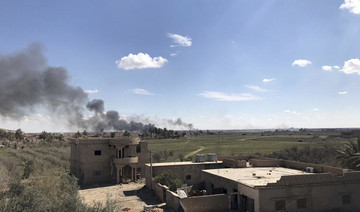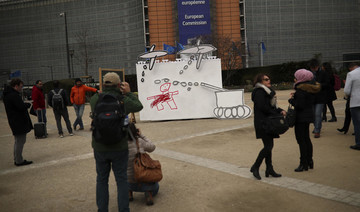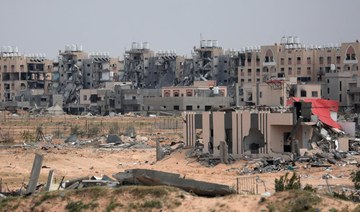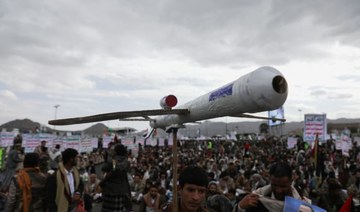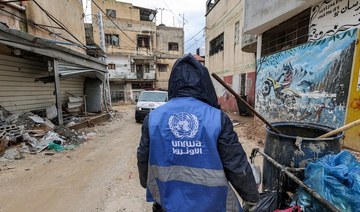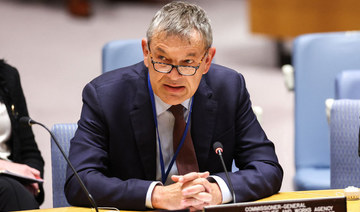AMMAN: The Syrian army, aided by Russian warplanes, attacked rebel-held towns in northwestern Syria on Wednesday in the most extensive bombardment in weeks against the last remaining rebel bastion in the country, rebels, rescuers and residents said.
Rebels who have fought to topple President Bashar Assad for eight years are now largely confined to the enclave in the northwest near the Turkish border. Around four million people now live there, including hundreds of thousands of opponents of Assad who fled there from other parts of the country.
The enclave is protected by a “de-escalation zone” agreement brokered last year by Assad’s main international backers Russia and Iran, and Turkey which has supported the rebels in the past and has sent troops to monitor the truce.
Residents said at least 12 aerial raids had hit Idlib city, including a civilian prison on its outskirts, where they said dozens of prisoners escaped. At least four civilians were killed.
Russia’s defense ministry confirmed it had hit Idlib in coordination with Turkey, targeting drones and weapons stores of the Hayat Tahrir Al-Sham (HTS) militants it said were intended for use in an attack on a major Russian air base near the Mediterranean coast.
The Syrian army has escalated its shelling of the enclave since early February. The attacks have killed dozens of civilians and injured hundreds, and led to tens of thousands of people fleeing frontline areas to camps and towns closer to the Turkish border, rescuers and aid agencies said.
The Syrian army denies targeting civilians and says the army is responding to stepped-up attacks staged by Al-Qaeda-inspired fighters who aim to wreck the truce and control the area.
Residents along the border area with Turkey could hear heavy overnight aerial strikes that covered a wide stretch of territory from rebel-held areas near government-held Latakia province on the Mediterranean to Idlib city toward the east and extending to adjoining opposition-held parts of northern Hama.
“They burnt the land... The sounds were heard very clearly,” said Ibrahim al Sheikh, a father of five in the border town of Atmeh. He quoted relatives as saying the shelling was the heaviest yet in the two weeks of escalation.
The escalation in the northwest is taking place as a US-backed Kurdish-led militia has launched a separate assault on the final bastion of Islamic State fighters on the opposite, eastern end of the country, creating turning points on both major fronts of Syria’s multi-sided civil war.
In the northwest, residents said white phosphorous munitions were fired overnight on the town of al Tamana in northwestern Idlib countryside, where rescue workers on Wednesday said they put out several fires caused by more than 80 rocket strikes.
Among the targets of the aerial campaign was a makeshift tent camp in Kfr Amim, east of Idlib city, that shelters displaced families, where two women were killed and at least 10 children injured when bombs landed after midnight.
“Whoever did this is a beast, truly a beast. It’s a camp with only women and children. There is nothing we can say except that this Russian beast is coming to kill,” said Laith al Abdullah, a civil defense worker in Sarqeb town who helped in the rescue effort, reached by mobile phone.
Rocket shelling from a major army base in Joreen, in Hama province, escalated a week-long bombardment of rural areas near the town of Jisr al Shaqour, said Ahmed Abdul Salam, a rebel commander in the Turkey-backed National Liberation Front.
A Russian army base, south of government-controlled Halafaya town, also targeted Kafr Zeita in northern Hama countryside while cluster bombs hit several rebel-held towns in southern Idlib, rebels said.
The stepped-up bombardment has depopulated opposition-held towns in the buffer zone that straddles parts of Idlib to northern Hama and parts of Latakia province.
The opposition-held city of Khan Sheikhon had become a ghost city with most of its more than 70,000 people fleeing, said Yousef al Idlibi, a former resident who moved to Idlib city.
Turkey, which began patrols in the buffer zone on Friday, has condemned what it said were increasing provocations to wreck the truce, and warned that a bombing campaign by the Russians and the Syrian army would cause a major humanitarian crisis.
Many residents are exasperated by the failure of Turkish forces to respond to the bombardments. The Syrian army has called for Turkish forces to withdraw.
Syrian forces and Russian jets intensify attacks on last rebel bastion
Syrian forces and Russian jets intensify attacks on last rebel bastion

- Rescuers say army used incendiary munitions
- Army says attacks militants who violated buffer zone
Egypt condemns Israeli human rights violations in Gaza Strip
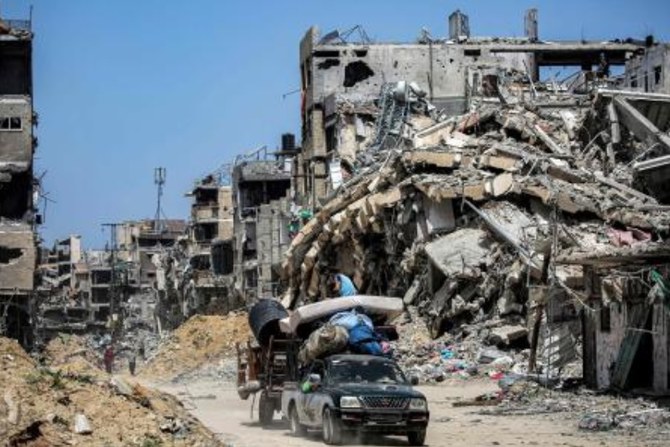
- Egypt said it condemned violations of international law including the targeting of civilians
- Abu Zeid reiterated the need for immediate intervention by the international community to stop such violations
CAIRO: Egypt has condemned the repeated Israeli violations of international law and international humanitarian law in the Gaza Strip.
The Egyptian Ministry of Foreign Affairs said: “It is regrettable and shameful that violations of international law and humanitarian values continue in such a flagrant manner in the 21st century, in full view and hearing of all countries, international organizations, and the Security Council.”
This came during statements made by ministry spokesman Ahmed Abu Zeid regarding the discovery of mass graves in the Nasser Medical Complex in Khan Yunis in the southern Gaza Strip.
Egypt said it condemned violations of international law including the targeting of civilians, displaced persons, and medical teams by Israeli forces.
Abu Zeid reiterated the need for immediate intervention by the international community to stop such violations and to conduct the necessary investigations to hold perpetrators accountable.
He added that the killing, destruction, and violence witnessed in the West Bank over the past few weeks is no less dangerous, further aggravates the crisis, and threatens to escalate tensions across all occupied Palestinian territories.
He called for an immediate halt to the violence and attacks by settlers, protected by Israeli forces, against Palestinian civilians, their property, and homes in the West Bank.
The bodies of over 200 Palestinians, including patients, have been uncovered so far in mass graves at the Nasser Medical Complex in Gaza’s Khan Younis since Saturday, according to media reports.
Hezbollah drones target northern Acre in response to Israeli strikes on Lebanese group
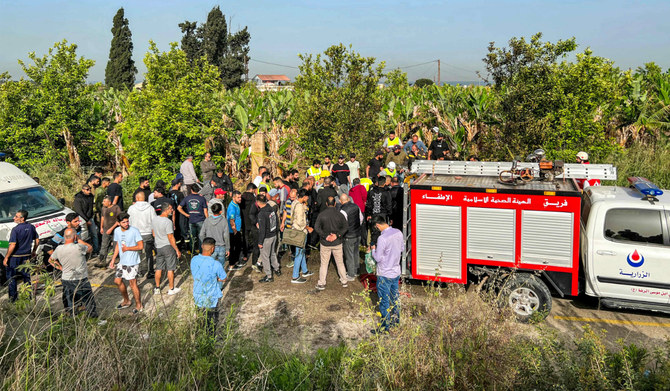
- Israeli media reported that “those present on the beach were evacuated after a Hezbollah drone was intercepted in the skies over Nahariyya and Acre”
- Israeli army had said it killed “two significant terrorists in Hezbollah’s aerial unit”
BEIRUT: Hezbollah forces in south Lebanon on Tuesday launched a combined aerial attack with diversionary and assault drones on Israeli military targets.
The focus of the Lebanese group’s attack was the headquarters of the Golani Brigade at the Shraga barracks, north of the city of Acre.
The attack was described as “a new qualitative strike against an Israeli site,” using drones said to be able to bypass Israeli radar and avoid Iron Dome missiles.
A security source told Arab News that the attack was “a sensitive targeting.” The area struck is more than 15 km from the border with Lebanon.
“This targeting took place in broad daylight while the Israelis were celebrating the Jewish Passover,” the source said.
Hezbollah said it launched the drones “in response to Israeli aggression against the Lebanese town of Aadloun and the assassination of a (Hezbollah) cadre there.”
Videos on social media showed explosions and smoke rising north of the coastal city of Acre, with beachgoers fleeing in all directions.
Israeli media reported that “those present on the beach were evacuated after a Hezbollah drone was intercepted in the skies over Nahariyya and Acre.”
A few hours after Hezbollah’s strike, Israeli warplanes carried out an airstrike on the town of Hanin, 7 km north of Bint Jbeil. It destroyed a two-story family house.
Initial reports said there were two casualties, including a woman, and five were wounded, some seriously, including women and children. The injured were transferred to hospitals.
Meanwhile, an Israeli military drone struck a car between the towns of Adloun and Al-Kharayeb, killing Hussein Ali Azqul, who reports suggested was an engineer working in Hezbollah’s air defense unit.
The group was left mourning a second member, Mohammed Khalil Attiya, from Qana, who died from injuries received a few days ago. The Israeli army described him as a “leader in the Radwan Force (a Hezbollah special unit).”
In ongoing cross-border clashes between Hezbollah and Israeli forces, the former said it had attacked “a gathering of Israeli enemy soldiers in the vicinity of Al-Asi,” to which Israeli fighter jets retaliated with airstrikes on the towns of Blida and Hula.
Israeli airstrikes continued relentlessly on Tuesday night, striking Yaroun and Al-Aishiya as well as other districts in south Lebanon.
The Israeli military also launched flash bombs over villages in the western and central areas, extending to the outskirts of Tyre, and on Tuesday morning fired heavy weapon rounds toward the towns of Naqoura and Jabal Al-Labouneh.
Houthi threats continue but attacks on ships in Red Sea appear to be on hold
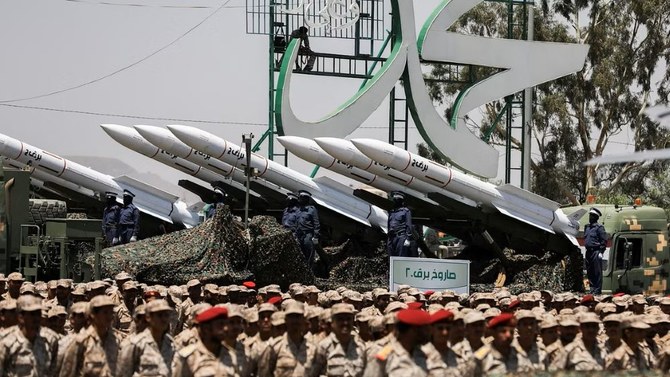
- Observers speculate the militia might be running out of drones and missiles, or air strikes by US and UK could have damaged launchers
- Houthis have claimed credit for significantly fewer assaults this month and international marine agencies have reported a decline in the number of strikes
AL-MUKALLA: Despite ongoing threats by Houthi leaders in Yemen that they will continue to attack international shipping in the Red Sea, the number of strikes on vessels has drastically fallen in recent weeks.
The group has not claimed credit for any assaults on ships since April 10. Analysts speculate that the militia might be running out of missiles and drones, or air strikes on Houthi targets by the US and UK could have damaged their launchers.
Since November, the Houthis have launched hundreds of drones, ballistic missiles and remotely controlled and explosive-laden boats at international commercial and naval ships in the Red Sea, Bab Al-Mandab Strait and the Gulf of Aden. They say they are acting in support of the Palestinian people and the aim is to force Israel to allow more humanitarian aid to enter the Gaza Strip.
Compared with the early days of their campaign, the Houthis have claimed credit for significantly fewer assaults this month, and international marine agencies have reported a decline in the number of strikes.
The organization UK Maritime Trade Operations, which records attacks on shipping, has not received any notifications of incidents in the Red Sea or Gulf of Aden since April 7, one of the longest periods with no reported attacks since the start of the Houthi campaign almost six months ago.
The US Central Command last reported intercepting Houthi missiles and drones on April 16. Prior to that it had been issuing almost daily notifications.
Despite the decline in attacks on shipping, the Houthis’ Political Office said on Monday it had instructed its military forces to escalate attacks in the Red Sea and Arabian Sea on ships linked to or bound for Israel in response to what it described as “genocide crimes” committed by Israel against Palestinians in Gaza.
Mohammed Al-Basha, an expert on the Middle East with the Navanti research group in the US, cautioned that the recent extended period without any claims of attacks does not necessarily mean the Houthis have halted their attacks in the Red Sea.
“The absence of frequent daily claims could also represent a strategic decision or the possibility of diplomatic or secret talks, rather than an operational inability,” he wrote in a message posted on social media platform X.
“This might suggest that the missile stockpile of the Houthis is diminishing, while the production of drones remains steady.”
Yemeni military analyst Brig. Gen. Mohammed Al-Kumaim suggested airstrikes in recent months by US and UK forces might have diminished the capability of the Houthis to launch attacks, and said the group might be settling into a war of attrition.
“The US may have targeted the few mobile missile launchers belonging to the Houthi militia; they need three or four launchers if they have 100 missiles,” he told Arab News.
The UN’s special envoy for Yemen, Hans Grundberg, said on Monday he held talks with Houthi negotiator Mohammed Abdul Sallam and Omani officials in Muscat to explore ways in which to advance a UN-brokered peace plan for Yemen while also reducing wider tensions in the Middle East.
Abdul Aziz Al-Bukair, a Houthi government minister of state, said the militia’s representatives discussed with Grundberg their recent negotiations with Saudi authorities, as well as issues such as payment of wages to public-sector workers, the reopening of key roads in Yemen, and oil exports.
The ongoing, UN-led peace efforts to end the near decade-long war in Yemen suffered a severe blow when the Houthis began attacking ships in the Red Sea in November.
Iran threatens to annihilate Israel should it launch a major attack
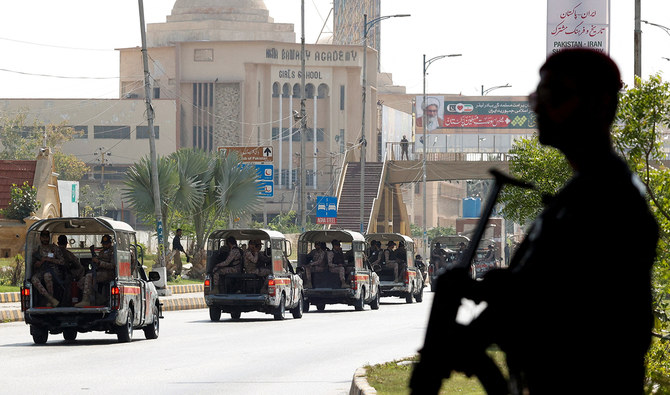
- Explosions were heard over Iran’s Isfahan city Friday in possible Israeli attack
- But Tehran played down the incident and said it had no plans for a retaliation
DUBAI: An Israeli attack on Iranian territory could radically change dynamics and result in there being nothing left of the "Zionist regime", Iran's President Ebrahim Raisi was quoted as saying on Tuesday by the official IRNA news agency.
Raisi began a three day visit to Pakistan on Monday and has vowed to boost trade between the neighbouring nations to $10 billion a year.
The two Muslim neighbours are seeking to mend ties after unprecedented tit-for-tat military strikes this year.
On Friday, explosions were heard over the Iranian city of Isfahan in what sources said was an Israeli attack, but Tehran played down the incident and said it had no plans for retaliation.
Iran launched a barrage of missiles and drones at Israel on April 13 in what it said was retaliation for Israel's suspected deadly strike on its embassy compound in Damascus on April 1, but almost all were shot down.
"The Islamic Republic of Iran will honourably continue to support the Palestinian resistance," Raisi added in the speech in Lahore.
Norway calls on donors to resume funding to Palestinian UNRWA agency
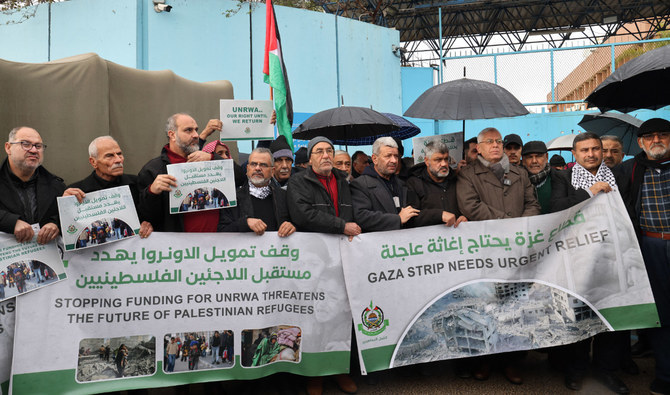
- Norway, also a major donor to the organization, argued that funding cuts put the population of Gaza at risk
- “I would now like to call on countries that have still frozen their contributions to UNRWA to resume funding,” Norway’s foreign minister Espen Barth Eide said
OSLO: Norway called on international donors on Tuesday to resume payments to the UN agency for Palestinians refugees (UNRWA) after a report found Israel had yet to provide evidence that some UNRWA staff were linked to terrorist groups.
The United States, Britain and others earlier this year paused payments to UNRWA following Israel’s claims, while Norway, also a major donor to the organization, argued that funding cuts put the population of Gaza at risk.
A review of the agency’s neutrality led by former French foreign minister Catherine Colonna on Monday concluded Israel had yet to back up its accusations that hundreds of UNRWA staff were operatives in Gaza terrorist groups.
“I would now like to call on countries that have still frozen their contributions to UNRWA to resume funding,” Norway’s foreign minister Espen Barth Eide said in a statement.
A separate investigation by internal UN investigators is looking into Israeli allegations that 12 UNRWA staff took part in the Hamas-led Oct. 7 attacks which triggered the Gaza war.
“Norway has emphasized that it is unacceptable to punish an entire organization, with 30,000 employees, and all Palestine refugees for the alleged misdeeds of a small number of the organization’s employees,” Barth Eide said.
While 10 countries have since ended their suspensions, the United States, Britain, Italy, the Netherlands, Austria and Lithuania have not. A UN spokesperson on Monday said UNRWA currently had enough funding to pay for operations until June.


